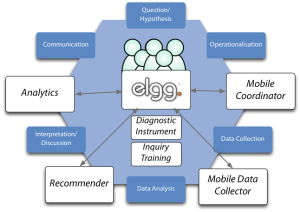News Story
A successful first review for weSPOT
Tuesday 12 Nov 2013
The weSPOT project had last week its first annual review in Luxembourg. Alexander Mikroyannidis represented the KMi team, which consists of him, Alexandra Okada and Peter Scott. The review was succesful, with the first year project outcomes being accepted by the Commission.
The project focuses on inquiry-based learning with a theoretically sound and technology supported personal inquiry approach. In inquiry based-learning learners take the role of an explorer and scientist and are motivated by their personal curiosity, guided by self-reflection, and develop knowledge personal and collaborative sense-making and reasoning.
The KMi team leads the work on the development of the weSPOT inquiry space, a personal and social inquiry based-learning environment. A widget-based architecture enables the personalisation of the inquiry environment, allowing teachers and students to build their inquiries out of mash-ups of inquiry components. Students can connect with their peers and form groups in order to build, share and execute inquiries collaboratively.
The weSPOT inquiry space has been developed by re-using and extending the open-source social networking framework Elgg. The weSPOT inquiry space is the hub that connects the various weSPOT components (i.e. Analytics, Recommender, Mobile Coordinator and Mobile Data Collector) and implements the 6-phase weSPOT inquiry based-learning model.
Year 2 will see the weSPOT toolkit being piloted and evaluated within a variety of learning domains in schools across Europe.
Related Links:
Latest News
KMi’s report from SEMANTiCS 2025
KMi wins OU recognition of Excellence in Teaching Award
KMi experts present insights on Technology-Facilitated Gender-Based Violence to UN committee
KMi with a impactful presence at Open Repositories 2025
Alexander Mikroyannidis appointed International Expert in Distance Learning by A3ES

